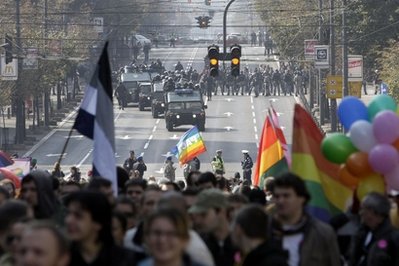 After I returned from Belgrade Pride, I decided to create a short video about this significant event. Shortly thereafter someone posted a comment calling me (supposedly) a very derogatory word in Serbian. That was my first comment! Not a 'bravo,' 'we support you,' or 'great job' - just hate speech. My first instinct was to delete the comment. Then I thought about responding instead. I decided on the latter. It got me thinking about whether speech like this is even permitted on Youtube. I certainly see it quite frequently on other comment feeds. The YouTube comments section seems to be a dumping ground for use-less, vitriolic, hate-filled speech. I often wonder why they let such behavior persist? Many say that it is allowed because it support a freedom of speech. I wonder if they would hold that opinion if that video was posted by their daughter or son. I wonder if they would defend their position if the hate speech was directed at a loved one. I wonder these things... So....
After I returned from Belgrade Pride, I decided to create a short video about this significant event. Shortly thereafter someone posted a comment calling me (supposedly) a very derogatory word in Serbian. That was my first comment! Not a 'bravo,' 'we support you,' or 'great job' - just hate speech. My first instinct was to delete the comment. Then I thought about responding instead. I decided on the latter. It got me thinking about whether speech like this is even permitted on Youtube. I certainly see it quite frequently on other comment feeds. The YouTube comments section seems to be a dumping ground for use-less, vitriolic, hate-filled speech. I often wonder why they let such behavior persist? Many say that it is allowed because it support a freedom of speech. I wonder if they would hold that opinion if that video was posted by their daughter or son. I wonder if they would defend their position if the hate speech was directed at a loved one. I wonder these things... So....I recently did a poll to ask folks whether they thought 'hate speech' should be banned from the YouTube comments section. The results were rather shocking. In fact, the distribution of votes was pretty even across the board, with half the respondents saying 'yes' and the other saying 'no.' Does this surprise you?
Background
It is not very hard to find so-called hate speech on YouTube. Simply scroll down on any popular video and you might be shocked (or not) to see word garbage spewed onto large sections of the comment feed. Bigoted comments against women, people of different races, nationalities, sexual orientations, gender identities, body types, disabilities, religions, economic levels, or levels of education. Trash! So why is it there? Why does it remain if it is not positive? Why allow it in the first place? Why not ban such speech?
 |
| Just a taste of the lovely YouTube comments I see every single day. (these are the tame ones...) |
'Hate Speech' Defined
 In Law,
In Law, What About Facebook?
In 2013, the popular social network revised its policy regarding certain hate speech. The change didn't come from the kindness of their hearts but more rather the depth of their pocketbooks. Facebook is, after all, a business. No, the change came about from pressure from Women Action Media (WAM), The Everyday Sexism Project and writer and activist Soraya Chemaly. This was in regards to posted content endorsing domestic violence and rape. The campaign successfully urged major business to withdrawal their adverts from Facebook. (Huff Post) The result? Facebook acquiesced. But what about YouTube?
It's Distasteful, But Is It Legal?
YouTube discourages content that condones violence under 'Hateful Content':
"Our products are platforms for free expression. But we don't support content that promotes or condones violence against individuals or groups based on race or ethnic origin, religion, disability, gender, age, nationality, veteran status, or sexual orientation/gender identity, or whose primary purpose is inciting hatred on the basis of these core characteristics. This can be a delicate balancing act, but if the primary purpose is to attack a protected group, the content crosses the line." Community GuidelinesIn fact, YouTube has specifically stated that 'Hate speech is not permitted.' (YouTube Policy Center)!
So there it is. What does this mean, exactly?
"Hate speech refers to content that promotes violence or hatred against individuals or groups based on certain attributes..."They encourage users to flag content, or file a report for repeated violations. Has anyone done this? What does this actually mean?
My Reflection
After all this poking around, I learned a lot from the side of the "free speech"ers. I began to see hate speech as an opportunity to start a dialogue. If only all hate-mongers actually wanted to engage in civil discourse... Sigh. Next time I see such speech, I'll be the first to open up that dialogue and see what happens. I'll even post it to my next blog. Such BS needs to be put on BLAST!

















